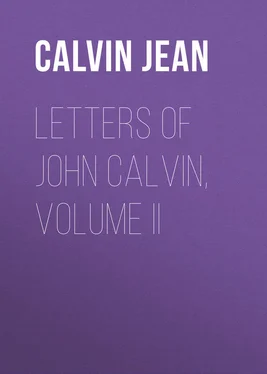Jean Calvin - Letters of John Calvin, Volume II
Здесь есть возможность читать онлайн «Jean Calvin - Letters of John Calvin, Volume II» — ознакомительный отрывок электронной книги совершенно бесплатно, а после прочтения отрывка купить полную версию. В некоторых случаях можно слушать аудио, скачать через торрент в формате fb2 и присутствует краткое содержание. Жанр: foreign_antique, foreign_prose, на английском языке. Описание произведения, (предисловие) а так же отзывы посетителей доступны на портале библиотеки ЛибКат.
- Название:Letters of John Calvin, Volume II
- Автор:
- Жанр:
- Год:неизвестен
- ISBN:нет данных
- Рейтинг книги:3 / 5. Голосов: 1
-
Избранное:Добавить в избранное
- Отзывы:
-
Ваша оценка:
- 60
- 1
- 2
- 3
- 4
- 5
Letters of John Calvin, Volume II: краткое содержание, описание и аннотация
Предлагаем к чтению аннотацию, описание, краткое содержание или предисловие (зависит от того, что написал сам автор книги «Letters of John Calvin, Volume II»). Если вы не нашли необходимую информацию о книге — напишите в комментариях, мы постараемся отыскать её.
Letters of John Calvin, Volume II — читать онлайн ознакомительный отрывок
Ниже представлен текст книги, разбитый по страницам. Система сохранения места последней прочитанной страницы, позволяет с удобством читать онлайн бесплатно книгу «Letters of John Calvin, Volume II», без необходимости каждый раз заново искать на чём Вы остановились. Поставьте закладку, и сможете в любой момент перейти на страницу, на которой закончили чтение.
Интервал:
Закладка:
[ Lat. orig. autogr. – Library of Geneva. Vol. 106.]
CLVII. – To Viret. 34 34 Viret was at that time plunged into the deepest affliction. He had just lost, after a long illness, his wife, Elizabeth Turtaz, of Orbe, with whom he had lived for many years in a godly union. The grief which he felt on that occasion is expressed, in a very touching manner, in a letter written many years afterwards to Calvin: – "I was so completely dispirited and prostrated by that arrow of affliction, that the whole world appeared to me nothing but a burden. There was nothing pleasant, nothing that could mitigate my grief of mind." – Calv. Epist. et Resp. , p. 53. The friends of Viret, and especially Farel and Calvin, lavished upon him, during that trial, marks of the tenderest and most brotherly affection. The familiar correspondence of Calvin furnishes us with precious revelations in this respect.
Come, on this condition, that you disengage your mind not only from grief, but also from every annoyance. Do not fear that I will impose any burden upon you, for through my means you will be allowed to take whatever rest is agreeable to you. If any one prove troublesome to you, I will interpose. The brethren, also, make the same promise to you as I do. I will also be surety that the citizens do not interfere with your wishes.
I know not what I ought to imprecate on the wretches who had spread a report of your death. Never did a letter from you arrive more opportunely. Although your death was announced, yet as mention was made of poison, Textor was already in the midst of preparations for the journey, that he might speed to Orbe on fleet horses. A great part of the brethren were present, all overwhelmed with deep affliction. Shortly afterward your letter made its appearance, and such exultation instantly broke forth, that we were hardly masters of our senses. It was fortunate that we did not pass a night of sorrow, else I should not have borne it without danger. But why do I detain you, and not rather incite you to hasten hither as quickly as possible? Adieu, brother and most agreeable friend. Salute respectfully the brethren James, Ribitti, Hubert, Cordier, Celio, Francis, Merlin. The Lord protect you and the remainder of your family. – Yours,
John Calvin.[ Lat. copy – Library of Geneva. Vol. 111.]
CLVIII. – To Viret
I have hitherto delayed writing to you, because I daily expected you to come hither, as you had promised; nor should I have written even now, as I remain in the same state of expectation, were it not that I might incite you to hasten your journey; for I wonder why it is that you thus put off from day to day. I remember that John de Tournay 35 35 Nephew of Viret, and minister in the Pays de Vaud.
told me that you had a horse; but why not rather come by boat? Unless David has sold his [horses,] that difficulty could be easily got over, although I believe that one may now be more easily procured than it could have been eight days ago, for fewer couriers have passed this way during these days. Make haste, therefore, that you may recruit a little, and gather heart again with us; for people from your quarter say that you are half dead. Since I can draw you out by no other inducement, I make the announcement, that you shall have no letter from me until you come. Quick, then. – Adieu. Salute all friends. May the Lord shortly bring you in safety to us. – Yours,
[ Lat. orig. autogr. – Library of Geneva. Vol. 106.]
CLIX. To Theodore Vitus. 36 36 To the most honourable Doctor Theodore Vitus, most faithful Minister of Christ at Nuremberg.
Your letter gave me the greater pleasure, as I had not ventured to look for it, for it was my part to draw a letter from you by being the first to write. But that you, without being called upon, should of your own accord have anticipated me, I take as a proof of your greater friendship towards me. If, however, you would know the reason of my not writing, I refrained more from modesty than negligence. And generally the testimony of Philip [Melanchthon] is with me sufficient; but when no great familiarity intervenes, the crooked policy of the times sometimes makes me apprehensive. Wherefore, I am the more grateful to you for having removed every scruple. I greatly rejoice, also, to find that my pamphlet, De Coenâ , has met with your approbation. 37 37 The following is the passage of the letter of Vitus to Calvin to which he here refers: – "I have read your short address to the people on the Sacrament of the Supper, and I approve of your calling the bread and wine signs in such a sense that the things signified are in reality present. Would that they who leave only the naked signs, might be led by you to adopt that view!" – Calv. Epist. et Resp. , Amst., p. 37.
It was written in French ten years before. When, without my knowledge, it had been already translated into Latin by two individuals, I at length consented to its publication, being afraid, in fact, that some worse version might forestall it. A style of instruction, simple and popular, and adapted to the unlearned, shews what my purpose was from the first; for I usually write more carefully for those acquainted with Latin. I laboured, however, not only faithfully to express my views, and reduce them within a brief compass, but also to unfold them lucidly, and without technicalities. Since then the Institution , having been revised, was again given to the public, in which, unless I am mistaken, I expound and more fully confirm the same doctrine, under a different form of expression, and with somewhat greater development. I at length also published a Catechism , which is trustworthy and pertinent evidence of the kind of doctrine with which the common people are imbued by me. Would that the people of Zurich, as you say, were willing to give their assent to that confession! 38 38 This desire was happily realized some years afterwards, by the adoption of a common symbol on the Supper, approved alike by the theologians of Zurich and Geneva.
I do not think Luther is so unyielding but that there might easily be an agreement, and they do not, withal, venture to disapprove of my views. The chief obstacle to their giving a public assent to my doctrine is, that being pre-occupied by a meaning, once and now for a length of time prescribed to them, they so stick to their customary forms as to admit nothing new. But if you consider the tyranny manifested by certain of the adverse party in the attempt to force the world, not only into their peculiar views, but also into a prescribed form of words, the furious insolence they shew, what commotions they excite, – the moderation as well as rectitude by which you are characterized, will lead you to condemn in the matter the absurd conduct of those parties, not less than the people of Zurich. May the Lord by his Spirit dispose us all to true moderation. You know that I am not in the habit of complaining when there is no ground for it; nor do I doubt but that you yourself, as might be expected from your eminent piety, sigh in secret over the same evils, while it is not in your power to remedy them. With respect to the assurances you give me regarding yourself, I wish you in turn to believe, that I am and always will be your sincere friend and brother. I now, with many others, request you to go on strenuously, and make no halt in your progress, until you have handed over to us Genesis completed. 39 39 Vitus lent useful aid to Luther in the revision of his different writings, and rendered a real service to the Church by collecting and offering to the public the Commentaries of Luther on the Prophet Micah, and the first eleven chapters of Genesis. – Melch. Adam, Vitæ Theol. Germ.
For as Luther has just grounds for congratulating himself in having found such an artist to polish his works, so others experience how advantageous the labour is to the public. I may have wished, however, that you had been more sparing in your mention of the Sacramentaries, because I see that the minds of some are thereby exasperated, of whom there was a hope that they would be brought to moderate views. It will be for you to consider what may be more conducive to that end. I will be satisfied if you take my warning in good part, whether or not you act upon it. The Ratisbon Assembly will indeed bring forth smoke for us, which the Lord will soon dispel. 40 40 The Conference opened by the Emperor at Ratisbon, and to which Bucer had been summoned, was a mere feint to divert men's minds, and to transfer the decision of the points at issue to the Council of Trent.
Интервал:
Закладка:
Похожие книги на «Letters of John Calvin, Volume II»
Представляем Вашему вниманию похожие книги на «Letters of John Calvin, Volume II» списком для выбора. Мы отобрали схожую по названию и смыслу литературу в надежде предоставить читателям больше вариантов отыскать новые, интересные, ещё непрочитанные произведения.
Обсуждение, отзывы о книге «Letters of John Calvin, Volume II» и просто собственные мнения читателей. Оставьте ваши комментарии, напишите, что Вы думаете о произведении, его смысле или главных героях. Укажите что конкретно понравилось, а что нет, и почему Вы так считаете.












